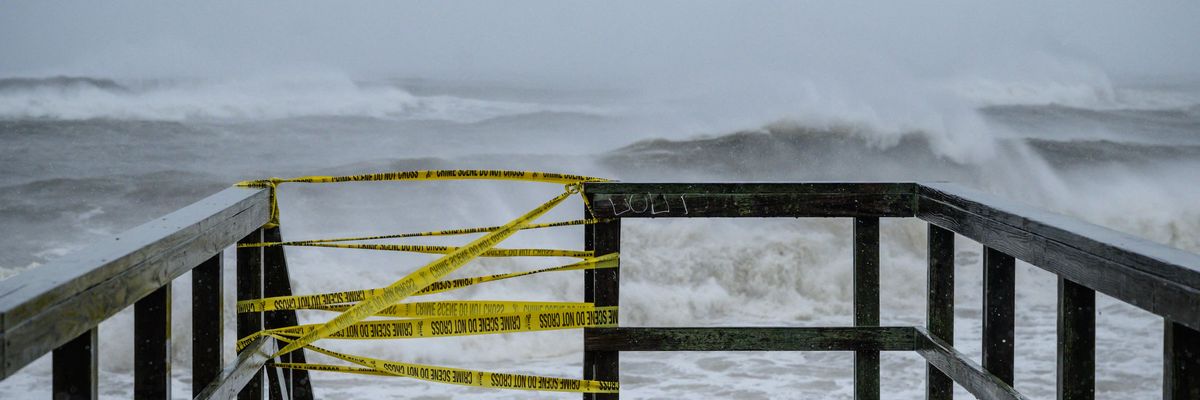New research out Tuesday shows that the world's oceans last year were hotter than they've ever been in recorded history--part of a long-term warming trend driven primarily by planet-wrecking fossil fuel emissions.
"This finding really underscores the urgency of acting on climate now."
According to an annual study published in the peer-reviewed journal Advances in Atmospheric Sciences, the past five years have been the five hottest for Earth's oceans since measurements began in the late 1950s.
Since the late 1980s, oceans have been warming eight times faster than they did during the preceding decades, and 2021 marked the third consecutive year in which the previous record for annual energy absorption was shattered. These trends, the paper makes clear, are due to "an increase in anthropogenic greenhouse gas concentrations."
"We want to stress that global warming is actually ocean warming, and ocean warming has serious consequences," Lijing Cheng, a lead author of the report and professor of environmental science at the Institute of Atmospheric Physics at the Chinese Academy of Sciences, told CNN. "Ocean warming keeps breaking records, which is a reminder that the world needs action to combat climate change."
The research on rising ocean heat content comes one day after the European Union's Copernicus Climate Change Service published an assessment showing that the past seven years have been the hottest in recorded history.
Like rising global surface air temperatures, the ongoing ocean warming pattern is caused by carbon dioxide and methane emissions, researchers say. Greenhouse gas pollution has surged over the past two centuries due largely to fossil fuel-powered capitalism and its insatiable profit motive.
As excess heat is trapped in the planet's atmosphere, oceans absorb 90% of it, leading to a sharp increase in ocean heat content, the paper explains.
"The impacts are perhaps subtle but profound," Kevin Trenberth, a co-author of the new ocean report and scientist at the National Center for Atmospheric Research in Colorado, told CNN. "To stop this [trend], we really need to get to net-zero [emissions], and many countries have plans but not enough actions to support those."
Before and during the recent COP26 climate summit, many governments pledged to reduce planet-heating pollution in the coming years, but new data showing a steady increase in greenhouse gas emissions and atmospheric concentrations reveals that empty promises won't be enough to avert the climate emergency's most catastrophic consequences.
If policymakers fail to take swift and robust action to decarbonize the world's energy system and economy, scientists warn, ocean heat content will continue to climb, further exacerbating extreme weather disasters that are already increasing in frequency, duration, and intensity.
"Warmer oceans supercharge weather patterns to create more powerful storms, hurricanes, and intense rainfall which leads to deadly flooding," CNN noted, pointing to Hurricane Ida's devastating effects along the Gulf Coast, the ensuing inundation of New York City's subway system, and Super Typhoon Rai, which killed hundreds of people in the Philippines over the holidays.
The Washington Post added:
The increase in ocean heat also raises air temperatures, allowing more moisture to enter the warmer atmosphere. For every 1.8 degrees of warming, heavy rain events will intensify by about 7%. 2021 marked one of the wettest years on record for the East Coast, thanks to a slew of tropical storms and summer thunderstorms.
The unusual December tornadoes that struck several states can also be traced back to the warm waters. In December, record warm temperatures in the Gulf of Mexico created an atmosphere more reminiscent of spring than winter. As such, two tornado outbreaks occurred in the southern and central United States in the same week.
Moreover, higher ocean temperatures threaten to disrupt marine life--which supplies a quarter of the world's protein--and put millions of people at risk of accelerated sea-level rise.
"Ocean warming is destabilizing Antarctic ice shelves from underneath, which could lead to the collapse of large pieces of the ice sheet such as the Thwaites glacier, threatening massive... sea level rise," Michael Mann, a climate scientist at Pennsylvania State University and one of the authors of the study, told the Post. "This finding really underscores the urgency of acting on climate now."
CNN reported:
As the oceans heat up, the water expands and sea level rises. Cheng said about one third of the total sea level rise during the 20th century was due to ocean warming alone. In addition to more high-tide flooding, sea level rise threatens coastal freshwater supply with saltwater intrusion, and makes coastal communities and infrastructure more vulnerable to storm surge.
Cheng said part of the reason action is so urgently needed is because the oceans will continue warming for decades after fossil fuel emissions are slashed.
As Trenberth explained, "the oceans are slow to respond," which is why "we must prepare better and build resilience" now.
The dangers associated with ocean warming, states the paper, "should be incorporated into climate risk assessments, adaptation, and mitigation," and be reflected in "engineering design, building codes, and modifications to coastal development plans."




